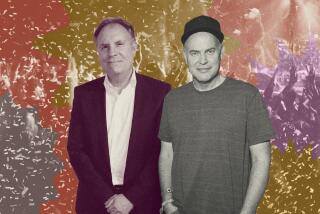Independent in vision, spirit and musical lineup
- Share via
INDIO — Vigilante Carlstroem, the guitarist with Sweden’s marvelously entertaining rock band the Hives, paused over the weekend when asked what differences he sees between the Coachella Valley Music and Arts Festival and the many tradition-rich rock festivals of Europe.
After gazing at Coachella’s pastoral desert setting on a day when the Beastie Boys, Queens of the Stone Age and three dozen other rock and dance-music acts served up 12 hours of often exotic, cutting-edge sounds on five separate stages, the good-natured musician said, “Palm trees.”
To say Coachella in just four years has captured the energy and spirit of the festival tradition that has brightened the European music scene for decades is a high compliment -- just one of many that concert promoters Paul Tollett and Rick Van Santen are receiving these days.
They are the unlikely team that has, against all odds, created the most acclaimed pop music festival in the country.
Without the blue “all access” band around his wrist, the boyish, soft-spoken Tollett would have had trouble Saturday convincing anybody that he wasn’t just another of the 35,000 faces in the crowd at the 80-acre Empire Polo Field, about 125 miles from Los Angeles.
Despite that low-key manner, Tollett and Van Santen, his even more understated partner in the concert firm goldenvoice, have the steely determination that in Coachella has enabled them to come up with one of the most inspiring success stories in the music business in years.
Success story in the music business?
If this were the first day of April rather than one of the last, it’d be easy to suspect that someone was pulling your leg by even suggesting that there are business success stories in the music industry anymore.
But Coachella, after a disastrous start financially in 1999, is seen as such a winner that an East Coast copycat festival will be held in June on New York’s Long Island and promoters in other cities are exploring their own versions.
The success is another reminder that individuals with strong, independent visions can still make a difference in an industry that often complains about the entrepreneurial spirit being swallowed up by giant corporations.
Coachella’s success also represents a revival of a festival concept that had become so tainted by primitive conditions and commercial greed in recent years that the shows were seen as a dirty word in rock.
Tollett and Van Santen brought a sense of innocence and integrity to the concept -- they were naive enough to think a festival would work if they booked quality bands rather than simply the popular ones, and if they paid attention to fan comfort. Clean toilets and reasonable prices ($2 water bottles, for instance) were as important as the music.
Still, it wasn’t easy. The first Coachella weekend had some major acts, including Beck and Rage Against the Machine, but goldenvoice lost so much money that Tollett hadn’t even acknowledged it publicly until now.
“Three quarters of a million,” he said backstage Saturday, still numbed by the figure. “It meant we had to struggle for almost two years to survive as a company.” Given that financial hit, it’s remarkable that goldenvoice, a Los Angeles firm that made its reputation in the ‘80s and ‘90s working with fresh alt-rock acts, didn’t abandon the concept as too risky.
“It was weird because we knew the day after the festival how much we had lost, yet the phone was ringing all day with people throughout the industry congratulating us on this great weekend and asking how they could get their bands involved.” When goldenvoice did resume the festival on a more modest one-day schedule in 2001, the pair stuck to their original principles. They avoided some big name acts who might have sold more tickets, but would have brought an aggressive crowd that could have spoiled the tension-free nature of the festival.
They also rejected raising concession prices here and there, or accepting sponsorship deals. Tollett estimates that he could pick up $300,000 to $500,000 by just turning the weekend into the, say, Chevrolet’s Coachella Valley Music and Arts Festival.
But he thinks those moves would violate the purity of the weekend. “I hate it when you go to shows and you are bombarded with all this advertising,” he said Saturday. “It just shows a lack of respect for your audience and the music.” Without the compromises, the 2001 festival again lost money -- but this time, a “low, low six-figure sum.” The festival went back to two days last year and just about broke even.
Tollett, 37, was optimistic Saturday about this year’s festival finally making a small profit.
Meanwhile, the goldenvoice team continues to get accolades.
Tollett, who promoted his first rock show while still in high school in West Covina, said there were so few expectations in the music industry that the festival concept would work in Southern California that they didn’t even have to set up a VIP area backstage in 1999. No one wanted to drive three hours from Los Angeles to see what they thought would be a one-time show.
That changed dramatically with the second and third festivals. There were lots of industry powerhouses backstage Saturday, including super-agents Marty Diamond and Rob Light as well as Capitol Records chief Andy Slater, fresh from his success in helping launch Lisa Marie Presley’s career. There were also some reported sightings of celebrities, including Cameron Diaz.
Even billionaire Phil Anschutz, whose Anschutz Entertainment Group bought goldenvoice for $7 million last year, was on hand Saturday to check out the festival. Relaxed backstage, he too had high praise for the team of Tollett and Van Santen, 40. He said he was pleased with the warm spirit of the crowd.
“Coachella has completely changed the rules for rock festivals,” Slater said. “It’s comfortable and civilized and the music is tasteful and forward thinking and the setting is lovely. In the ‘70s, rock festivals meant beat-up old ballparks and massive lines to get to the bathroom. It was almost as if you would like the music better if you had to suffer during the day.”
Given the praise, it would be easy for Tollett and Van Santen to simply sit backstage and soak up the accolades. Instead, they were constantly patrolling the grounds Saturday, looking for potential problems -- whether it was a broken water fountain or malfunctioning toilets.
“You worry most about the things that you can’t control ... like the weather and, above all, the crowd safety,” Tollett said.
For years, the relationship between rock ‘n’ roll and law enforcement has been strained. But there was no sign of tension Saturday. By the time the final band stopped playing just after midnight, an Indio police detective described the crowd as a “good bunch.”
There was one technical hitch when problems with the sound system in one of the tents forced the Libertines, an excellent British band making its U.S. debut, to stop its set after two numbers because of a midnight curfew.
Otherwise, everything seemed right on schedule -- even the temperature, which was in the mid-80s as predicted.
Tollett appeared exhausted as the thousands of fans began heading for the parking lots. He looked forward to three or four hours sleep before returning to the grounds Sunday, when the music again would rumble through the desert.
More to Read
The biggest entertainment stories
Get our big stories about Hollywood, film, television, music, arts, culture and more right in your inbox as soon as they publish.
You may occasionally receive promotional content from the Los Angeles Times.










